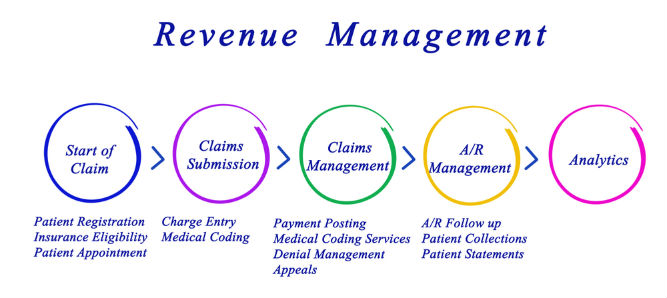Nearterm Blog
Why Is Revenue Cycle Management Important in the Healthcare Industry?

Revenue Cycle Management (RCM) plays an important role in the healthcare industry. Managing revenue is vital for any business but may not be the primary focus of healthcare providers. However, these providers need revenue to pay for medical supplies, salaries, equipment, and more.
Healthcare costs are increasing with technology adoption in a time when an aging population is foreshadowing increased demand for care. Insurance and medical suppliers are placing an increased burden on patients and providers. Value-based healthcare payment models are also reshaping how providers can approach revenue cycle management.
What Is Revenue Cycle in Healthcare?
Revenue Cycle Management is how an organization handles the finances and processes associated with different steps of patient care from start to finish. It begins when a patient is first encountered or scheduled for an appointment and continues through the services provided to the billing afterward. Patient scheduling offers the opportunity to gather information vital to the claims process, such as insurance information, to verify eligibility.
The healthcare revenue cycle process includes coding medical services and billing insurance. Making sure that patients have eligible insurance on file can help in determining costs for various treatments. Faster and more accurate claims transmission allows for greater flexibility in arranging patient care.
After medical services have been provided, another key medical billing RCM process emerges. Managing past due patient accounts and accounts receivables impact the provider’s cash flow through collection times. The revenue cycle in healthcare also includes bad debt or managing uncollectible patient records. When patient accounts are up to date, the cycle continues with scheduling the patient’s next visit and perhaps even offering reminders.
What Is Revenue Cycle Management in Healthcare?
While there are variations between provider types and how the specifics are handled, medical revenue cycle management revolves around the finance and administrative side of the organization.
What is RCM in medical billing? This includes not just patient collection issues but also costs and efficiency of claims submission. These factors are also impacted by staff training.

Medical billing has been impacted by recent changes to healthcare models that now focus on value-based care. In addition to this, medical providers have also recently been required to transition to new diagnosis codes ICD10. For more information on understanding the hospital revenue cycle and for assistance with various related issues, consider Nearterm’s Healthcare Revenue Cycle Consulting.
Why Is Revenue Cycle Management Important in the Healthcare Industry?
There are many benefits to efficiently managing your revenue cycle. The overall goal is to increase revenue throughout the various processes by first identifying points of friction and then resolving them.
These problems may include fraud, waste, and abuse such as unnecessary tests and procedures. For some healthcare providers, revenue and finances are not the primary concern. Some may be more focused on patient care.
Problems and issues with an RCM process in healthcare can impact various other processes and take time away from patient care or medical training. The rapid pace of technological improvement has also greatly improved medical billing through electronic data interchange made available by healthcare clearinghouses and electronic claims submission. Technology has improved many other areas but also resulted in new security issues.
Medical revenue cycle management also includes medical records and how they are accessed and stored for billing purposes. Recently there has been an increase in attacks on medical organizations aimed at accessing medical records. These records and other personal health information (PHI) are protected by federal law such as the Health Insurance Portability and Accountability Act (HIPAA) Privacy and Security Rules.
Ensuring medical records are properly protected while processing financial information is a key concern that could potentially detract from patient care. This emphasizes the importance of health information management at your organization. Effective hospital revenue cycle management will include the security of PHI and patient financial information.
Finally, the RCM process in healthcare is important because it can be analyzed to find a process that can be automated safely leading to more time spent with the patient. For more information on why you should outsource your RCM administrative and financial needs contact the healthcare management consultants at Nearterm today!
Revenue Cycle Management Process in Medical Billing

The healthcare revenue cycle management process traditionally involved long delays between patient care and associated payment as claims submission was a lengthy process. This is the communication between healthcare providers and the patient’s insurance companies to negotiate payment for services as well as negotiating payment with patients.
What insurance will pay for is impacted by many factors including the patient’s specific plan and what diagnosis codes the provider submits. The medical billing RCM process involves preparing a claim and sending it the insurance. These days technology allows for rapid claim inputting and submission as well as automated “scrubbing” to ensure these claims meet basic requirements for acceptance.
Claims can be rejected for a wide range of problems ranging from a lack of information, improper coding, compatibility issues, and system errors. The number of claims that pass on their first attempt is a key metric to consider in the revenue cycle for medical billing. Multiple claims rejecting for the same errors could be caused by problems with the inputting process as a result of a lack of training. They may be resolved with the proper medical billing denial management process.
Electronic claims can allow for immediate approval for procedures and services from a patient’s insurance company. This can allow a provider to offer a range of services to the patient and increases the likelihood of receiving associated payments. Thus efficiently managing claims allows for greater flexibility in patient care concerning their finances and ability to pay. It also allows the potential for decreasing collection times on services which translates to increased cash flow and better Key Performance Indicator ratios.
On the extreme side of the revenue cycle is the issue of outstanding payments leading to bad debt. Managing the collections process is not always pleasant and will detract from providing valuable care to patients, especially to those in need. Some providers choose to write off the bad debt as a loss.
Efficiently managing RCM, at many different steps in the process, may help to decrease the number of cases that reach bad debt. One powerful solution to these issues is to contract with a third party Healthcare Revenue Cycle Management company. Nearterm’s Healthcare Management Consultants can offer experienced RCM consulting to help increase cash flow, lower bad debt expenses, improve patient satisfaction with financial services, as well as reduce operating costs and increase productivity.
Contact the Nearterm team oday for more information about how our services can make you more productive and profitable.
